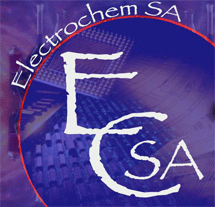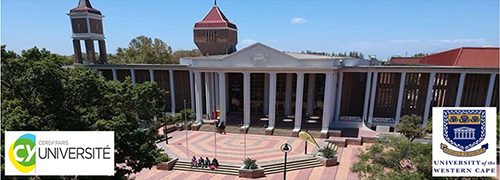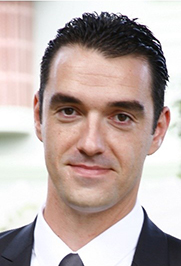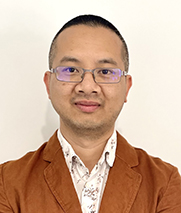

PRESENTS: 2ND SENERGYLAB WORKSHOP ON RECENT ADVANCES IN
SENSORS AND
ENERGY DRIVEN APPLICATIONS AND
ELECTROCHEMISTRY MASTERCLASS SERIES 1
WRASEA and EMS1 11 - 12 April 2024


Speakers
Day 1 - Electrochemistry Masterclass Series

Dr. Carlos M. Sánchez-Sánchez (Sorbonne Université)
Masterclass Presenter
Dr. Carlos M. Sánchez-Sánchez joined the French National Center for Scientific Research (CNRS) in 2013 as an Associate Researcher in Paris. He is a specialist in Scanning Electrochemical Microscopy (SECM) and Electrocatalysis. He obtained his PhD in Chemistry from the University of Alicante (Spain) in 2004, under the supervision of Prof. Aldaz and Prof. Montiel. He is a former postdoctoral fellow from Prof. Allen J. Bard lab in the University of Texas at Austin, where he contributed to develop the SECM as a useful tool in Electrocatalysis. Nowadays, he leads efforts to develop new actuation modes of SECM for local interrogation of (photo)electrocatalytic materials for environmentally relevant applications such as CO2 and nitrate conversion at Laboratoire Interfaces et Systèmes Electrochimiques (LISE) located in Sorbonne Université (Paris).

Frank Marken (University of Bath)
Masterclass Presenter
Frank Marken has in September 2004 been appointed to a Senior Lecturer position and in 2011 promoted to a personal chair in electrochemistry at the Department of Chemistry. Research is based in materials and process electrochemistry. Professor Frank Marken is a Fellow of the Royal Society of Chemistry, a Fellow of the International Society of Electrochemistry, and an active member of the Gesellschaft Deutscher Chemiker, the American Chemical Society, and the Electrochemical Society. He was awarded the RSC Theophilus Redwood Lectureship 2008 and the RSC Barker Medal 2018. Frank has published >600 articles in peer-reviewed journals (ISI h-index 67).
Employment history:
Bath University: 2004 Senior Lecturer / 2008 Reader / 2011 Professor
Loughborough University: 2000-2004 Lecturer at the Department of Chemistry (Royal Society University Research Fellow)Oxford University: 1995-1997 Postdoctoral Researcher 1997-2000 Stipendiary Lecturer at New College, Oxford University (Royal Society University Research Fellow) La Trobe University: 1992-1995 Feodor Lynen Stipendiate (Humboldt Foundation) RWTH Aachen: 1992 Dr. rer. nat. degree “Triple Decker Complexes in Cyclopentadienide Transfer Reactions”
Frank organises annual training courses and meetings on electrochemical techniques (Bath Electrochemistry Winter School, Bath Electrochemical Impedance Summer School, Great Western Electrochemistry Meetings) and national/international scientific meetings. Research interests are focused on the fundamental mechanistic understanding of multi-interfacial processes and the development of novel electrochemical technologies with applications in solar energy conversion, hydrogen generation, electrosynthesis, energy storage, and in water purification/desalination. Frank has mentored early career academics, supervised 7 postdoctoral researchers, supported 25 completed PhD projects, and is currently guiding 6 further PhD projects. Publications are based on processes in microporous materials, nanostructures, photo-electrochemistry, three-phase junctions, ultrasound and microwave-activation, paired and self-supported electro-organic syntheses, ionic diodes, desalination, and electroanalysis.
Cooperation with academics in the UK and international cooperation
The research is supported by strong national and international collaborations and aligned with the sustainable chemical technology doctoral college theme at Bath. Collaborations with academia are predominantly at national level (Bath, Oxford, Cambridge, Edinburgh, Cardiff, Exeter, etc.) but also strongly developed at international level. Joint Royal Society funding applications allowed me to work with the Academy of Sciences in Warsaw (Poland) and with Lomonosov State University in Moscow (Russia). A joint EPSRC-NSF grant allowed me to work with Prof. Gary Blanchard at Michigan State University (USA). Strong collaborations have been developed with Prof. O. Arotiba (Johannesburg, South Africa), with Prof. L. Mascaro (Sao Carlos, Brazil),
and with Prof. A. Kulandainathan (CECRI, Karaikudi, India).

Tumaini S Mkwizu (Bruno Steiner Lab Consultancy)
Masterclass Presenter
Dr Tumaini Mkwizu is a professional natural scientist in the field of chemical science. He received his bachelor’s degree in Chemistry and Mathematics from University of Namibia and his Honours and Master’s degrees in Chemistry from University of the Witwatersrand. He obtained his Ph.D in Chemistry from University of Pretoria in 2016. He completed his postdoctoral research fellowship at University of the Witwatersrand, where he carried out research on materials synthesis, solid-state characterization and high-temperature electrochemistry of bismuth and lanthanide based electroceramic materials for potential applications in solid oxide fuel cells and electrolysis cells. His research interests have mainly been in fundamental and applied electrochemistry and materials science with focus on: (i) electrochemical instrumentation; (ii) thermodynamic and kinetic modelling of interfacial electrochemical processes; (iii) synthesis and characterization of nanoscale materials; (iv) heterogeneous electrocatalysis and related electrochemical reaction dynamics; (v) synthesis of nanoparticulate metal-based composite electrode materials, including electrochemical fabrication of nanostructured interfaces and thin-films; (vi) solid-state chemistry; (vii) electrochemistry of metal–ligand complexes; and (ix) development of novel materials for clean energy technologies and electrochemical devices. His academic endeavours include lecturing undergraduate chemistry and serving as an instructor for laboratory intensive chemical science courses. Dr Mkwizu is currently serving as an honorary researcher at the School of Chemistry, University of the Witwatersrand. He is also a consulting scientist on instrumentation solutions for laboratory equipment companies. He has co-authored peer-reviewed research articles published in journals such as Crystal Engineering Communications, Analytica Chimica Acta, Langmuir, Journal of the Electrochemical Society and Electrochimica Acta.
Day 2 - 2nd SENERGYLab Workshop

Paul van Loosdrecht (University of Cologne, Germany)
Plenary Speaker
Paul van Loosdrecht studied physics at the Einhoven university of technology. He obtained his PhD from the university of Nijmegen in 1992 for work on fundamental excitations in incommensurate crystals and fullerenes. He was awarded a NWO ‘Talent’ award to work on endohedral fullerence at IBM-Almaden research center in the USA. After post-doc positions at the high magnetic field laboratory in Grenoble and the university of Aachen he moved to the University of Groningen on a NWO ‘Springplank’ award where he became a full professor in optical condensed matter physics in 2003. In 2013 he moved to the university of Cologne. His main interests are the fundamental properties of complex matter and optical manipulation of molecular and complex matter using advanced linear and non-linear spectroscopies. Central to his current research are non-equilibrium material physics and the role of spin-orbit coupling, correlations, and topology in the physical properties of novel quantum materials. He published over 200 peer reviewed articles, has been Dean of the Faculty of Mathematics and Natural Sciences (2020-2023), and is editor for Physics Reports.

Philippe Banet (CY Cergy Paris University)
Keynote Speaker
Dr. Philippe Banet is Associate Professor at Laboratory of Physicochemistry of Polymer and Interfaces (LPPI) at CY Cergy Paris University (CYU) in France. He’s an engineer graduated from Ecole Nationale Supérieure de Chimie et de Physique de Bordeaux in 2001 and he received in 2004 his PhD degree in chemistry from University of Montpellier. After a postdoctoral position in Pr. Moreau’s group in ENSC Montpellier and a second one in Dr. Tran-Thi’s group in CEA-Saclay he joined CYU in 2007. He works on polymers and nanomaterials in the field of electrochemical biosensors and energy storage devices. His research deals with (bio)functionnalization of electrodes or surfaces by various methods: self-assembled monolayers, electrochemical deposit, hydrolysis condensation... Moreover, he is interested in the use of nanomaterials (metallic nanoparticles, carbon nanotubes) to develop new sensing transduction process in order to enhance the sensitivity of electrochemical biosensors and to increase performances of supercapacitors.

Thanh-Tuân Bui (CY Cergy Paris Université)
Keynote Speaker
Thanh-Tuân Bui was born (1983) and grew up in Vietnam but he did all of his higher education in France. He obtained his undergraduate and Master degrees at Paris 11 University and his postgraduate engineering diploma at ENSCM. In 2010 he received his PhD from the University of Toulouse. Since September 2013, he has been Associate Professor at CY Cergy Paris University. His research interests focus on organic functional materials for energy conversion and storage technologies covering from molecular design and materials engineering to device application.

Keagan Pokpas (University of the Western Cape)
Keynote Speaker
Dr. Keagan Pokpas is a distinguished senior lecturer & researcher of Analytical Chemistry at the University of the Western Cape, where he has been since 2018. He holds an MSc in Nanoscience and a PhD in Electroanalytical Chemistry from the same institution. Dr. Pokpas’ research focuses on the development of innovative electrochemical and colorimetric, paper-based, and electronic field-effect transistor (FET) sensors designed to monitor emerging and priority environmental pollutants and detect disease biomarkers. He has made significant contributions to the development of sensitive, low-cost analytical devices as an alternative to conventional molecular spectroscopic techniques, particularly for application in underdeveloped regions. Driven by a passion for scientific exploration, his research has been widely recognized and published in reputable journals and a wealth of research awards. With a commitment to innovation, Dr. Pokpas’ research continues to push the boundaries of scientific knowledge for electroanalytical sensing aimed at improving environmental & human health.

Anh Nguyen (CY Cergy Paris University)
Invited Speaker
Anh Nguyen is from Vietnam, she has a BSc degree in Analytical Chemistry at Ho Chi Minh National University of Science (Vietnam). After that, she moved to Daegu University (South Korea) to pursue her MSc and PhD studies in Electrochemistry before starting a postdoctoral fellow at CY Cergy Paris University (France) in 2022. Her main research interests have focused on the development of heterogeneous electrocatalysts for sustainable technologies such as fuel cells, water electrolysis and sensor applications. Her studies are on nanomaterials, polyelectrolytes and carbon-related materials like graphene, carbon nanotubes, carbon quantum dots etc. The objective of her research is to alternate traditional fossil fuels with sustainable energies to address the global energy demand and environmental issues.

Dr Wafeeq Davids (SAIAMC, University of the Western Cape)
Invited Speaker
Dr Wafeeq Davids completed his PhD in 2012 at the University of the Western Cape (UWC); his research was focused on the surface chemistry of metal hydride materials (MH) for hydrogen storage. Upon completing his PhD, he pursued a post-doctoral research fellowship (2013-2017) at HySA Systems, working on synthesizing metal hydride alloys, system integration of hydrogen storage tanks coupled with PEMFC stacks and developing metal hydride compressors. Presently, his employed as a Key Technology Specialist on hydrogen technology-related applications at the South African Institute for Advanced Materials Chemistry (SAIAMC) within the South African Hydrogen and Fuel Cell Technologies RDI Program (HySA Systems Competence Centre hosted by UWC).
Dr Davids current research activities focus on hydrogen storage, hydrogen compression and hydrogen fuel cell system integration. Dr Davids is an internationally recognized researcher in the fields of hydrogen energy and technology, hydrogen storage, material science and application of metal hydrides (35 Scopus-indexed publications cited 1152 times; h-index 22), eight patents and six prototypes. In 2021, Dr Davids became an NRF-rated researcher (category C3).
The main research achievements of Dr Davids include (i) contribution to the discovery of the effect of hydrogen activation by MH; (ii) contribution into the development of novel poisoning-tolerant surface-modified MH materials; (iii) discovery of combustion-type hydrogenation of magnesium-based nanocomposites; (iv) development of new prototype MH systems for hydrogen storage, separation/purification and compression, including industrial-scale ones; (v) starting the manufacturing of MH alloys in South Africa.

Dr Grace Nomthandazo Ngubeni (University of the Witwatersrand)
Invited Speaker
Grace Nomthandazo Ngubeni (PhD) is a Lecturer and Researcher in the School of Chemistry at the University of the Witwatersrand. Dr Ngubeni obtained her Bachelor of Science (Chemistry & Biochemistry), BSc Honours (Chemistry) and Master of Science degrees in Physical Chemistry studying phthalocyanines at Rhodes University. She obtained her Doctor of Philosophy degree at the University of the Witwatersrand. She is part of the Carbo-NanoWEBS research group which focuses on Carbon and Nanomaterials synthesis for Water, Energy, Biomedical/Bioplastics, and Sensor research. Her main research interests have been dedicated to investigating quaternary semiconducting nanomaterials for application in renewable energy. Her research has explored the fabrication of dye sensitized solar cells using known and novel semiconducting quaternary nanomaterials. Moreover, she is also interested in the synthesis of composites (using carbon & nanomaterials and plant & nanomaterials) to develop materials for application in water filtration and bioplastics.

Prof Christopher Arendse (University of the Western Cape)
Invited Speaker
Christopher Arendse is a Professor of Condensed Matter Physics in the Department of Physics and Astronomy at the University of the Western Cape, where he also obtained his PhD degree in 2004. His research expertise is in the areas of nanophysics, nanotechnology and thin-film physics for application in electronic devices. His research is currently focused on the large-area chemical vapour deposition of low-dimensional hybrid perovskite and silicon nano-structures and thin films for integration into stable, efficient and low-cost electronic devices. He nurtures a keen interest in raising awareness about sustainable development and natural renewable resources, including access to low-cost energy supply.